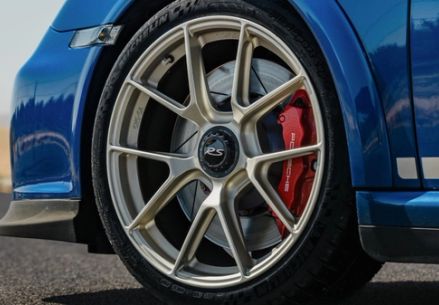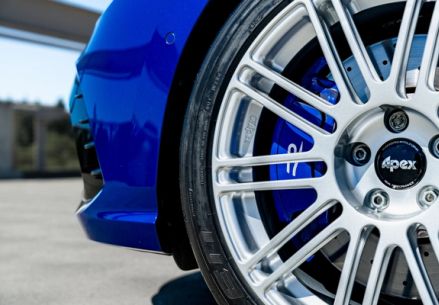
Industry Myth: You can easily compare performance between wheels and brands.
Article | 03/19/2024 by Ryan March
Updated on 08/06/2024
Unfortunately, you cannot easily compare the performance of wheels from one brand to the next, or even within the same brand. If you’re in the market to buy wheels to make your car faster, you’re put into a tough situation. There are no established standards for articulating performance within the wheel industry besides weight, and even that gets manipulated. The rest of the info you have is basic sizing specifications such as: diameter, width, and offset. If you’re not careful, you can easily end up wasting good money on wheels that overpromise and underdeliver.
Isn’t wheel weight a good enough indicator of performance? Doesn’t a lower weight mean superior performance? The problem is weight reduction is rarely free, especially when prices are low. We know that manufacturers often shortcut strength and stiffness to reduce weights in order to look more competitive on paper, such as overly thin spokes and lips. If buyers can’t compare other variables then they may be giving up a lot for that low weight. That's created a booming industry of fashion wheels being sold into performance applications with ease. It’s created a market where consumers who are shopping for high performance wheels are often buying weak and floppy wheels in motorsport aesthetics, and paying a healthy price too.
We don’t compare the performance of a car or computer using weight only. We look at a lot more. A car might be light but it may have very little horsepower, or a laptop might be heavier but it may have a much bigger screen and faster cpu. Ideally a buyer could see the performance differences between multiple wheel designs so they weren’t forced to just buy on price, weight, and design. You deserve more information, and you should demand more from the industry.
The closest thing to comparing strength right now is the load rating, but that’s not uniformly measured. Max loads are calculated many different ways with formulas that spit out different numbers. Load testing is often just a pass/fail measurement and doesn't account for true strength. How do you spot the wheels that would fail just beyond the limit, and the ones that have a lot of extra safety margin? Right now, you can’t.
It’s odd to only pay attention to the weight of a wheel instead of factoring in how the location of mass on that wheel affects its resistance to acceleration and deceleration. Imagine a figure skater bringing their arms in to spin faster, and holding their arms out to slow their spin. This is rotational inertia, and the physics don't change in a wheel. A wheel might be light, but where is its weight located? Rotational inertia can easily be calculated and can act almost like a dyno measurement between wheels of different designs, and do an even better job of showing off changes in diameter.
Could there be a standardized way of measuring strength, stiffness, rotational inertia, and many other variables? Absolutely! Although, it would take a published industry standard that is regulated and validated to ensure companies were measuring everything similarly and accurately. Even something as simple and straightforward as weight is not consistent in the industry currently, so adding more and expecting consistency is a dream right now.
For some people these extra variables may cause confusion or analysis paralysis. We see that as a small price to pay in our mission to deliver Real Performance. Real can be measured and compared, and is more than just fashion. We’re currently working out the details on how we can clearly compare stiffness and rotational inertia across our wheel designs. How we communicate and calculate performance will certainly evolve with time, but we’ll always strive to make that information more accessible and useful. We’re striving for a future where you can compare performance between brands with ease.
 Ryan March
Ryan MarchIf you like cheap gear you will hate this newsletter.





